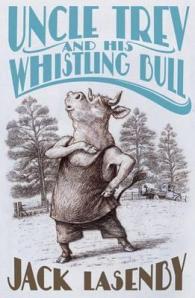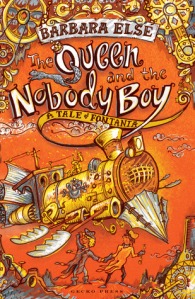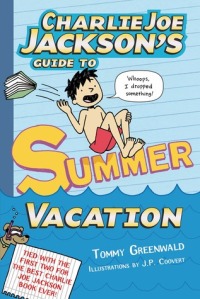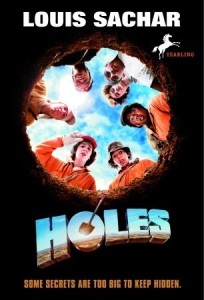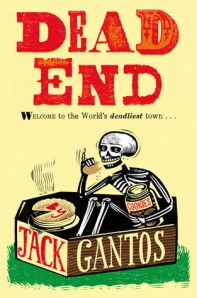 Dead End in Norvelt – Jack Gantos
Dead End in Norvelt – Jack Gantos
Winner of the Newbery Medal 2012, Washington Post Best Children’s Book of 2011.
Middle Grade – Readers 10 – 13+
When Jack Gantos was seven, his favourite game was to pretend he was on fire and roll down a hill to put the flames out – and that explains a lot, really. There’s not a lot of time to reflect, in his novels. Usually, you’re on fire and rolling down the hill before you’ve really decided whether or not you’re going to play the game. Things happen at break neck speed, with the odd pause to get yourself back up to the top of the hill, ready to roll for your life again. (This game, by the way, never seems to wear out. I watched a group of 8 year olds playing it the other day. Do you remember the sheer pleasure of seeing how fast you could roll, how many kids you could bump into on the way, and the smell of the grass – especially if it was damp and had just been cut.)
This novel has more than an element of the ‘do you remember’ about it. It is nostalgic for 1962, small town, America. Norvelt has a special history in that it was founded by Eleanor Roosevelt (hence Norvelt) for families who were struggling financially. To be honest, at times it does feel a little self-conscious about ensuring you know when it is set – for example, ‘It was a good thing John Glenn had orbited the earth back in February.’ And, of course, JFK is still alive. But it does well to introduce a version of the early 1960’s small town America to today’s young readers. ‘My uncle who had painted the pony claimed he had seen a UFO come down over that very same hill before the drive-in was built. He was in the newspaper and said he had ‘touched’ the UFO and that it was ‘covered in a strange Martian language that looked like chicken feet.’ My dad called my uncle a nut, but it wasn’t so nutty when the army sent troops and a big truck to take the mysterious UFO away and afterward military police went door-to-door to all the little towns around here, warning people not to talk about ‘the fallen object’ with any strangers as they might be Russian spies.’ Without going into the politics in depth, the reader gets a sense of the cold war, space as the next frontier, and a more censored world, possible in a less technological era.
It is the golden rule of middle grade fiction that, if you haven’t killed off the parents, they must be incredibly unfair, and unwilling to listen to reason. Certainly they will be misguided. Maybe they are even a bit mad. Probably they are so busy in their own lives that they barely notice the antics of the hero, who has the mindboggling challenge of needing to put the world to rights, without anyone noticing that it wasn’t right in the first place. No one must know anything is wrong, because usually it is the fault of the hero, who had a misguided moment of klutziness, whilst doing something forbidden. Things get worse before they get better, despite the best intentions of our hero, but in the end… well, I’d hate to ruin a good story, so I’ll stop right there.
Jack is not so much a klutz, as a bit day dreamy, ‘because my mind wanders in the morning my feet are always a few steps ahead of me…’ When we first meet him he is on a picnic table in his back yard, with his father’s WW2 Japanese war souvenirs, watching a drive-in war movie, using the Japanese binoculars. Jack also has his father’s sniper rifle, and the movie enemies are for target practice, ‘because Dad said I had to get ready to fight off the Russian Commies who had already sneaked into the country and were planning to launch a surprise attack.’ Jack doesn’t realise that the rifle is loaded and one thing leads to another, which leads to Miss Volker dropping her hearing aid down the toilet, and the town plumber, who is also the local ambulance driver, roaring up to Miss Volker’s house in the ambulance to help.
Mom now has Jack over a barrel, so to speak, since Dad will blow a fuse if he knows Jack has been playing with his war souvenirs, and especially that he broke the rifle safety rules. Jack is mystified as to how the gun came to be loaded, but accepts the error of his ways, and the inevitability of a severe consequence. Mom grounds him until his father returns, with the only exception being that he is allowed to leave the house to help out their eccentric octogenarian neighbour, Miss Volker. It turns out that Miss Volker needs him because, due to her severely arthritic hands, she is unable to write anymore. She has Jack scribe the obituaries of the elderly townspeople, who suddenly seem to be dropping like flies.
Unfortunately for Jack, when Dad comes back he has an agenda of his own that involves Jack mowing down Mom’s cornfield. Dad says Jack must mow it down. Mom says Jack mustn’t. The reader knows Jack can’t win this one, and feels the injustice. Jack mows down the corn and is grounded for the rest of summer, by his mother. Jack’s adventures might well make a great read aloud – if you can stand all the blood and gory bits – Jack’s nose bleeds constantly, his best friend’s father owns a funeral parlour, a Hell’s Angel motorcycle club member is flattened by a truck, and several elderly residents are found dead. Jack’s errands for Miss Volker are often dubious, if not downright dangerous and law breaking. He dresses up as the grim reaper to break into a house where Miss Volker suspects a senior citizen lies dead. She needs him to check, so that she can write the obit. He drives her car round town at break neck speed, and buys 1080 poison from the hardware store to kill the rats in her basement. There is also the mystery of why the town’s elderly are suddenly dying…
I have a couple of boys lined up to read this one over the next couple of weeks – they have already read the blurb and are keen. I’m keen to see what they think. I think it’s a great read, but I’m interested to know if there’s just a bit much history tucked into the book. As any parent knows, there are only so many green things you can hide in something yummy before it is spotted for the vegetable that it is.
Speaking of which, here’s a titbit for the Kiwi’s. Jack is reading about Kennedy during WW2. Apparently, ‘Kennedy and his torpedo boat crew were on night patrol in the sea around the Solomon Islands when a Japanese destroyer came roaring at full speed out of the mist and sliced their boat clean in half. Eleven men survived the collision but some were burned badly from the fuel fire that took place after the crash. Kennedy had been hurled across the deck and fractured a vertebrae in his back but he could still move.
…Kennedy tied one end of a belt onto the most wounded man’s lifejacket and put the other end of the belt in his own mouth and swam the breaststroke for five hours before he got the man to the island. There was no food or fresh water…(lots of things happen and many days pass but…) But just before the men lost all hope, the native islanders tracked them down. They were friendly and wanted to help so Kennedy scratched a rescue note on a coconut and gave it to the islanders, who paddled their war canoe to an Allied base. More days passed, and just when Kennedy and his men thought they all would die, they were rescued by soldiers from New Zealand.’
There is a sequel to this book, ‘From Norvelt to Nowhere’, so if this goes down well, then I may buy it.
Read some other reviews here:




